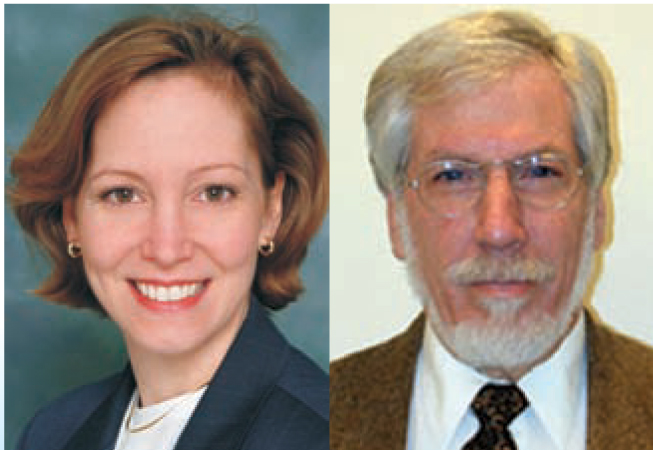Flatten Succeeds Lerch as APS International Affairs Director
DOI: 10.1063/1.1712495
On 2 February, Amy Flatten became head of international affairs at the American Physical Society. She took the torch from Irving Lerch, who stepped down last December, 11 years after founding the program.
After earning her PhD in 1993 from Georgia Tech for research on polarization-preserving optic fibers as acoustic sensors, Flatten became a high-tech consultant. In one job, she led a team that designed a prototype of a ballistic missile alert communications system. In another, she looked at the impact of telecommunications systems on business. “I found that I enjoyed the bigger questions more than I enjoyed the detailed questions of the lab,” she says. At the same time, she adds, “I missed the international picture.” So she moved first to the US Department of Commerce, where she worked with industry and government on international telecommunications policy development, and then to the White House Office of Science and Technology Policy (OSTP), where she spent five years before joining APS. She plans to continue teaching on the side at Johns Hopkins University, as she has done for nearly a decade.
At OSTP, Flatten promoted international collaboration in S&T. Among other things, as the office’s lead on US–Russian relations, she worked with government representatives to smooth the way for scientific collaborations on peaceful issues between former Russian nuclear scientists and US researchers. That culminated last November in a memorandum of understanding in high-energy and nuclear physics.
Also while at OSTP, Flatten initiated and oversaw all aspects—from fundraising to recruiting and directing international agencies’ participation—of the annual Global Science and Technology Week, intended to stimulate schoolchildren’s interest in math and science. In addition, she provided policy recommendations and analysis for the president’s science adviser and worked on S&T issues with the United Nations Educational, Scientific and Cultural Organization (UNESCO), the Organisation for Economic Co-operation and Development (OECD), and other international organizations.
It was Flatten’s immediate boss at OSTP who told her about the opening at APS. “During a meeting one day,” says Flatten, “she nudged me and handed me her BlackBerry™,” which displayed an announcement of the position. “I wasn’t chomping at the bit to find something outside of OSTP, but when this came along, it was a perfect fit. Promoting international scientific collaborations is a long-term career goal of mine. The opportunity to dig in and focus on that, and to launch initiatives and see them through, exactly meets my interests and objectives.”
Lerch remains active in the international science policy arena. For now, he is planning an April workshop in Azerbaijan on science teaching and research in central Asia and the Caucasus. As a consultant for UNESCO and other organizations, he is involved in setting up a series of workshops on rebuilding the science base in Iraq. And he is keeping an eye on developments at home, where, he says, “there are a lot of forces impeding the free exchange of information and the circulation of scientists. We are creating a very viscous system for scientists coming to the US.”

Flatten Lerch
APS

More about the authors
Toni Feder, American Center for Physics, One Physics Ellipse, College Park, Maryland 20740-3842, US . tfeder@aip.org





